#evening adhkaar
Text
Advice for those who were blessed by Allah by reaching these blessed days:
Remember that this dunyah is a test and that like all other tests, the further you go the harder it gets.
The ending of Ramadan is not as easy as the beginning, the distractions have increased, the mood is low, the motivation has died, but you don’t want to ruin all what you’ve done in these 20 days, so stand up and go pray your qiyaam, don’t abandon your tarawih, and don’t abandon the Quran, increase in adhkaar, and don’t let anything distract you.
If the environment you’re in makes you feel like you should just give up, say jokes on you all and go get your stuff done.
Don’t let anything or anyone ruin these days for you, for when you stop your worship because of people you are just helping them against you…
If you let your nafs and the shayateen of ins get a hold of you and get you to give up you’re the only loser, each one of us will be in his grave alone and “so and so made me mad” or “so and so are all against me” are not going to be enough as excuses in front of Allah the day each one of us sincerely regrets his shortcomings.
We should get used to worship even under stress and calamity, for the same way we want Allah’s blessings even when we disobey him, we should worship him even when he tests us.
بارك الله فيكم.
13 notes
·
View notes
Text
WHAT TO DO IN THE LAST 10 NIGHTS OF RAMADAN
by Asma bint Shameem Alhamdulillaah the long awaited last ten nights of Ramadhaan are here!Are you ready to spend these nights in worshipping Allaah Subhaanahu wa Ta’aala?Are you ready to give it your VERY BEST and get your sins forgiven?Yes! For sure Alhamdulillaah!🌷Aa’ishah Radhi Allaahu anhaasaid: “When the last ten days of Ramadhaan began, the Prophet Sal Allaahu Alayhi wa Sallam would tighten his waist-wrapper, spend his nights in prayer, and wake his family.(al-Bukhaari 2024, Muslim 1174). So how to spend these beautiful nights so that Allaah will be pleased with us?🔺 Worship ALL TEN nights of this blessed month if possible, to be SURE to catch Laylatul-Qadr Bi idhnillaahi Ta’aala.
🔺Remember that Laylatul-Qadr starts at MAGHRIB time.
🔺Do NOT waste your time in unnecessary things. Rather take advantage of *EACH MINUTE and EACH SECOND*
🔺Prepare yourself:Get ready to worship Allaah in the best of forms by taking a bath, use miswaak, wear special clothes, and perfume yourself.
🍃 Ibn Rajab said:”Ibn Jareer said: They used to recommend to shower every night of the last ten nights and an-Nakhai used to shower in every night from them and he used to shower and use perfume in the nights which he hoped was laytul Qadr…[until he said]…Thabit said: Tamim ad-Daari used to have a hulla [type of clothing] which he bought for 1000 dinars and wore it on the night he hoped was laytul-Qadr. So like this, it is recommended in the night which it is hoped to be laytul-Qadr to clean oneself, adorn, use perfume, shower, wear good clothing as it is legislated for Jumu’ah and the Eids. Like this, it is legislated to wear adornment in all the prayers as Allaah Subhaanahu wa Ta’aala said:خُذُوا زِينَتَكُمْ عِنْدَ كُلِّ مَسْجِدٍ“O Children of Adam! Take your adornment (by wearing your clean clothes), while praying”[7:31]
🍃 Ibn Umar Radhi Allaahu anhu said:“Allaah has more right that you beautify yourself for him. It was also reported as a Hadeeth raised to the Prophet Sal Allaahu Alayhi wa Sallam [Saheeh Jami no. 652]”(Lataaif al-Maarif pg. 189)
🔺Pray Qiyaam al-Layl. 🍃The Prophet ﷺ said: “Whoever stands [in prayer] in Laylatul Qadr out of true faith and seeking reward, then his previous sins will be forgiven for him.” (Al-Bukhaari 1901 and Muslim 759)
🍃Shaikh ibn Baaz said:“Its standing is done by way of the prayer and by making dhikr and by supplicating and reciting the Qur’aan and other than that from the aspects of good.”(Majmoo’ Fataawaa vol 15 p.426)
🔹Pray LONG rak’aat in your Qiyaam. You can do that even if you’ve not memorized the Qur’aan, by reading directly from the Mus-haf. Try to read much of the Qur’aan in in each rak’ah. This way you get BOTH, your Salaah as well as your Qur’aan recitation done. Also do LONG Rukoo and Sujood. Make your rukoo long by saying the various adhkaar proven from the Sunnah. Prolong your sujood by making LOTS of duaas in Arabic (and in your OWN language if you don’t know Arabic) and in your own words. Go SLOW and ENJOY your solitude with your Rabb. SAVOR *every moment* of it. Don’t be in a rush.
🔺Read Qur’aan with MEANINGS. PONDER and REFLECT. And try to UNDERSTAND what your Rabb is commanding you.
🔺Make a LOT of duaa. Beg. Cry. Implore. ASK whatever you want. He’s *listening*. He *knows* what’s in your heart. But He likes to *hear* it from you.
🔺Do lots of ISTIGHFAAR especially the duaa that the Prophet sal Allaahu Alayhi wa sallam taught Aaishah radhi Allaahu anhaa. اللهم إنك عفو تحب العفو فاعف عني“Allaahumma innaka afuwwun tuhibbul afwa fa’fu anni.”And don’t just “SAY” the words. “MEAN” it when you say...“O Allaah! Forgive me!REFLECT over your sins. And make sincere Taubah.
🔺Keep your tongue BUSY with DHIKR of Allaah while you’re driving to the masjid, preparing suhoor or any time you’re not reading Salaah or the Qur’aan. You can even LISTEN to the Qur’aan to take full advantage of the night.
🔺If you’re on your period, you can do ALL of the above except offer Salaah. And you can still read the Qur’aan in this state, as well. There’s no proof that a woman cannot read Qur’aan while on her menses. Just be careful not to touch it directly. Or you can use an electronic device instead.
🔺What about OTHER good deeds such as giving sadaqah, visiting the sick, or your family to keep up ties of kinship or other general good deeds?Although generally speaking, it is good to be extra generous in Ramadhaan, some of the scholars say that there’s nothing in the Sunnah that shows that the Prophet ﷺ specifically gave sadaqah or visited the sick or did other unspecified good deeds in the last ten day just because it’s Laylatul Qadr. The only thing that is proven from the authentic Sunnah is spending the night in prayer, reading Qur’aan and making duaa. That’s what the Prophet ﷺ did.
🍃 The scholars said:“What was narrated from the Prophet ﷺ concerning staying up at night during the last ten nights of Ramadhaan is that those nights should be spent in prayer and dhikr. Charity during Ramadhaan is better than charity at other times, but we do not know of anything in the Sunnah to indicate that giving charity in the last ten days is better. But the scholars stated that righteous deeds are better when done at times of virtue, and undoubtedly the last ten nights of Ramadhaan are better than any other nights, because Laylat al-Qadr is among them, which is better than a thousand months. Whatever the case, what is prescribed for the Muslim is to give a great deal of charity throughout Ramadhaan. The Prophet ﷺ was the most generous of people and he was at his most generous during Ramadhaan.”(al-Bukhaari 6, Muslim 2308)”(Islamqa Fatwa 37720)
🍃Someone asked Shaykh Ibn ‘Uthaymeen:“What is the ruling on specifying laylatul Qadr for giving a lot of charity?Shaykh Ibn ‘Uthaymeen said: “This is likewise from the acts of innovations. It [i.e. Laylatul Qadr] should only be specified for the night prayer.”
🍃 Shaikh Abdul Azeez Aal Ash-Shaykh said:“No doubt charity in Ramadhaan has virtue, but is Laylatul-Qadr specified for charity over the other nights? This is something we withhold from saying.”
🍃 Shaikh Salih al-Usaymee explains this and said:“The fourth subject is the author’s statement, ‘The actions which occur in it [i.e. Laylatul-Qadr] are better than the actions of one thousand months in which this night is not found’The article (ال) in the word ‘the actions’ (العمل) is for definiteness (عهدية) intending a specific action, which is mentioned in the statement of the Prophet ﷺ:مَنْ قَامَ لَيْلَةَ الْقَدْرِ إِيمَانًا وَاحْتِسَابًا غُفِرَ لَهُ مَا تَقَدَّمَ مِنْ ذَنْبِه‘Whoever established prayers on the night of Qadr out of sincere faith and hoping for a reward from Allaah, then all his previous sins will be forgiven’ [Agreed upon]It is standing the night in prayer, reciting the Qur’aan, and supplication in it;And NOT “unrestricted actions”.What occurs [from people] in terms of preferring to increase in various righteous good deeds on Laytul-Qadr is a “mistake” in the understanding of the intent of legislation of this night. Whoever observes these last ten nights in attempts to obtain the good mentioned in it by feeding the hungry, clothing a naked person, providing treatment for a sick person, giving charity to a poor person, being dutiful to a parent, being good to the neighbor, or tying the ties of kinship, then all of these actions are NOT the intent in regards to it. Whoever remains in the masjid in these last ten nights hoping to catch Laylatul-Qadr by establishing in it the prayer and the recitation of the Qur’aan and supplication, then he is in agreement with what the legislation commanded; Not the one who left off the prayer and recitation of the Qur’aan and turns towards increasing in good deeds like charity, Ihsaan, dutifulness to parents, tying the ties of kinship. This meaning is innovated [and] not known to the Salaf (may Allah have mercy upon them)”.
🔺So strive to do your best and keep yourself busy in the worship of Allaah Subhaanahu wa Ta’aala throughout the night.
🍃As Shaykh Ibn ‘Uthaymeen said: “Laylatul Qadr – in it the door is opened and the dearest are brought near and the discourse is heard and the reply is given and for those who apply themselves to endeavour; there is written within it an immense reward. Laylatul Qadr is better than a thousand months, so strive hard, may Allaah have mercy upon you in its pursuit. For this is the time for pursuit, and beware of negligence, for in negligence there is ruin.”(Majaalis Shahr Ramaadhaan p.255)May Allaah enable us to witness Laylatul-Qadr. May He enable us to worship Him in a manner that’s pleasing to Him, and accept from us. May He forgive us and our families and loved ones and save us all from the Fire of Hell. And Allaah knows best.
7 notes
·
View notes
Text

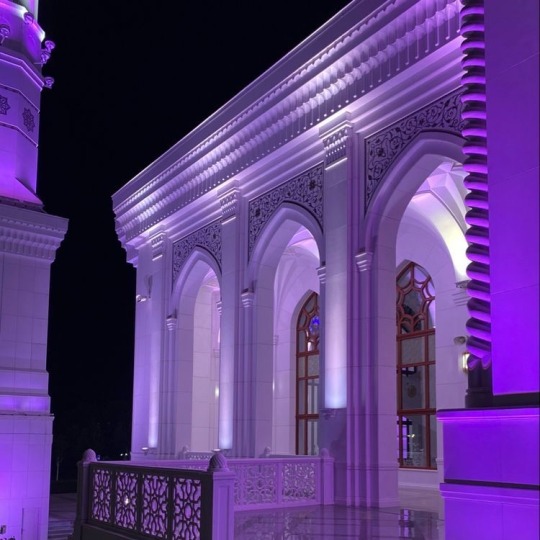

Khushoo’ in Salah
(Part 4)
The means of developing Khushoo’
4. Thinking about the aayaat and adhkaar being recited during the prayer and interacting with them.
The Qur’aan was revealed to be pondered over. Allah says (interpretation of the meaning): “(This is) a Book (the Quraan) which We have sent down to you, full of blessings that they may ponder over its Verses, and that men of understanding may remember.” [Saad 38:29]. No one can ponder over its verses unless he has some knowledge of the meaning of what he is reciting, so that he can think about it and be moved to tears by it.
•Another way of helping oneself to ponder over the meanings is to repeat aayaat, because this will help one to think deeply and look again at the meanings.
•Another way of helping oneself to ponder over the meanings is to memorize Quraan and various adhkaar to be recited during different parts of the prayer, so that one may recite them and think about their meanings.
5. Pausing at the end of each ayah:
This is more helpful in understanding and thinking about the meaning, and it is the Sunnah of the Prophet ﷺ , as Umm Salamah (رضي اللّٰه عنه ) described how the Messenger of Allah ﷺ would recite, “Bismillah il-Rahmaan il-Raheem”, and according to one report, he would pause, then say, “Al-hamdu Lillaahi Rabbi‟l- „Aalameen, al-Rahmaan, al-Raheem.” Then according to one report, he would pause, then say, “Maaliki yawm il-deen,” and he would break up his recitation ayah by ayah. (Reported by Abu Dawood, no. 4001; classed as Saheeh by al-Albaani in al-Irwaa‟, where its isnaads are described. 2/60).
•Pausing at the end of each ayah is Sunnah even if the meaning continues into the next ayah.
•Reciting in slow, rhythmic tones (tarteel) and making one’s voice beautiful when reciting. The Prophet (peace and blessings of Allah be upon him) “would recite a surah in such slow rhythmic tones that it would be longer than would seem possible.” (Reported by Muslim, no. 733).
•Another way of helping oneself to have khushoo’ is by making one’s voice beautiful when reciting. This is something that was advised by the Prophet ﷺ , as when he said, “Beautify the Qur‟an with your voices, for a fine voice increases the Quraan in beauty.” (Reported by al-Haakim, 1/575; Saheeh al- Jaami‟, no. 3581).
6. Knowing that Allah responds to prayers:
The Prophet ﷺ said: “Allah ﷻ has said: I have divided the prayer between Myself and My slave, into two halves, and My slave shall have what he has asked for.” When the slave says “Praise be to Allah, Lord of the Worlds”, Allah says, “My slave has praised Me.” When the slave says, “The Most Merciful, the Bestower of Mercy,” Allah says, “My slave has extolled me.” When the slave says, “Master of the Day of Judgement,” Allah says, “My slave has glorified me.” When the slave says, “It is You alone we worship and it is You alone we ask for help,” Allah says, “This is between Me and My slave, and My slave shall have what he asked for.” When the slave says, “Guide us to the Straight Path, the path of those whom You have favoured, not the path of those who receive Your anger, nor of those who go astray,” Allah says, “All these are for My slave, and My slave shall have what he asked for.” (Saheeh Muslim).
•This is a great and important hadith. If everyone kept it in mind when he prays, he would attain immense khushoo’ and al-Faatihah would have a great impact on him. How could it be otherwise, when he feels that his Lord is addressing him and giving him what he is asking for?
•This “conversation” with Allah must be respected and accorded its proper value. The Messenger of Allah ﷺ said: “When any one of you stands to pray, he is conversing with his Lord, so let him pay attention to how he speaks to Him.” (al-Haakim, al-Mustadrak, 1/236; Saheeh al-Jaami‟, 1538).
Source: 33 Ways of developing Khushoo’ in Salaah by Sheikh Muhammed Salih Al-Munajjid
#islam#islamic#muslim#convert to islam#life#ahlussunnahwaljamaah#ahlusunnah#salafi#salafushalih#sayings of the salaf#makkahalmukarramah#makkah#madinah#madinahalmunawwarah#masjid#masjid al aqsa#masjidalnabawi#masjidalharam#islamicquotes#islamic reminders#islamic quotes#motivationalwords
29 notes
·
View notes
Text
DO NOT SKIP YOUR MORNING AND EVENING ADHKAR!
Shaykh Muhammad Sa'eed Raslaan, Hafidhahullahu Taʼala said:
"If you're afflicted with something you dislike, don't blame but yourself! The morning and evening incantations (adhkaar), for instance, are more important than breathing. They should be a standard that one follows strictly. They are more important than breathing. Don't fall short with regards to them. Otherwise you're entering a battle without weapons. You will have exposed your chest and become a target, for an enemy who won't show you any mercy."
📖 {Source : Fataawa Shaykh Muhammad Sa'eed Raslaan||Translated by 'Abdurrahim Ibn Muhammad Al-Hadhrami}
43 notes
·
View notes
Photo
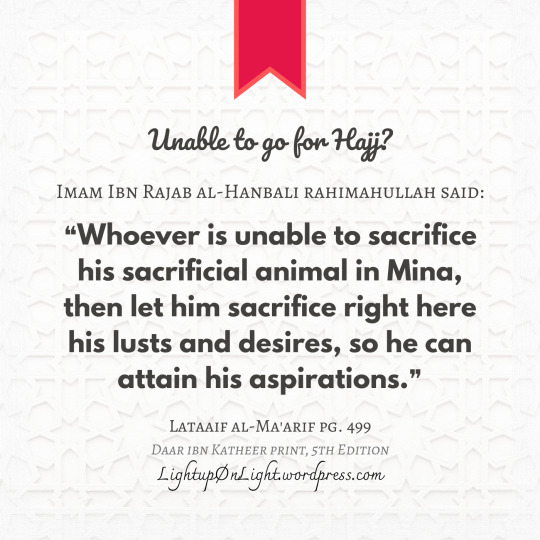
Some of us may think that the virtues of the 10 blessed days of Dhul-Hijjah are only for the hujjaj. Yes, the hujjaj will be doing the best ‘ibaadah that any of us can do in these days, but what about those who can't go for Hajj? Are we deprived of the virtues of these 10 days?
Absolutely not, alhamdulillah. The Rabb of the Ka’bah is the same Rabb that we all worship. So what can we non-hujjaj do? Here are some recommendations, bismillah:
✔️ Fix the quality of our obligatory acts of worship, eg. our daily salaah, and our relationship with our parents and family. Always get our obligatory ‘ibaadah covered first.
✔️ Make sincere tawbah and istighfar. Dhul-Hijjah is the last month of the hijri year, and it’s a great reminder for us to take stock of our shortcomings and sins. Be honest and ask ourselves: Am I happy with the ‘ibaadah I did this year?
✔️ Fast the first 9 days of Dhul-Hijjah (don’t fast on the 10th – that’s the day of ‘Eid).
✔️ If we have difficulties to fast on any of these days, then at least fast on the 9th of Dhul-Hijjah because of its immense reward: For just one single day of fasting, Allah expiates our sins of 2 years — the past, and the coming year. [Sahih Muslim 1162b]
✔️ Make dhikr abundantly even as we walk, or idling at home. It doesn't take much, just a simple mindfulness while we do remembrance of Allah. And the best adhkaar in the first 10 days of Dhul-Hijjah are: Tahleel (Laa ilaaha illAllah), Takbeer (Allahu Akbar), and Tahmeed (Alhamdulillah). [Musnad Ahmad 5423]
✔️ Increase in doing other voluntary 'ibaadah such as optional salaah, reciting the Qur’an, giving in charity, making supplications, doing da’wah, and other good deeds.
Remember that good deeds done in these 10 days are more beloved to Allah than any other day in the entire year. May Allah help us utilise these days to the best of our capability, and accept from us.
Your sister in Deen,
Aida Msr ©
5 notes
·
View notes
Photo

If you've wasted the last week, then now is the time to step up your ibaadah ! Tomorrow, ( the day of ' Arafah ) utilise your time wisely, seclude yourself in worship without any distractions. How to benefit from the day of 'Arafah ? 1. Set your alarms for the last third of the night. Make a firm resolve and make duah asking Allah ta'ala to help you wake up. 2. Prepare a list of every single Dua you wish for (even small ones). 3. Wake up in the time of tahajjud and pray 2 rakah or 4 or whatever you can . And seek forgiveness 4. Eat sahoor while intending the fast for the day of arafah 5. Pray Fajr and do not rush to your phone or other things. Instead sit back and do all the adhkaar after fajr salat and remember Allah till sunrise. 6. If you pray salatul AlDuha after sunrise , then the reward is like complete hajj and umrah. 7. Recite a page or two from the Qur'an and begin your day. 8. Keep reciting the best supplication on the day of arafah , all day. 9. Do not sleep through dhuhr and asr. Pray your fardh salaat and try praying nawafil as well. 10. Between asr and maghrib , use the precious time for seeking forgiveness, ask Allah all your wishes (Dua list) Spend time reciting some pages of the Qur'an because each alphabet has a reward of ten good deeds. 11. Do not forget the takbeer after each fardh salaat. PUT YOUR PHONE AWAY, Stay far from social media. WHY? The Blessed Laylatul Qadr is NOT KNOWN , yet we strive hard to find it so that we can get its blessing. The Blessed Day of Arafah is KNOWN , will we not do enough to reap its blessings? How we strive during Laylatul Qadr is exactly how we should strive in the Day of Arafah ! Such Blessed times occur only ONCE in a Year ! Strive hard... @islams_message #muslimah #hijabi #sabr #islam #islamicquotes #arafat #islamicreminders #muslimillustrator #madewithlove #doodlesofinstagram #usdoodles #illustrator #notmyquote #doodlesoftheworld #dayofarafah #muslimquotes #quranicverse #alhamdulillahforeverything #arafa #digitaldrawing #mashaallah #allahisthegreatest #doodle_art #instamuslim #muslimhijab #islamisbeautiful #islamic_art #quraan #prophetmuhammad #islams_message https://www.instagram.com/p/CfsqUWnKcj3/?igshid=NGJjMDIxMWI=
#muslimah#hijabi#sabr#islam#islamicquotes#arafat#islamicreminders#muslimillustrator#madewithlove#doodlesofinstagram#usdoodles#illustrator#notmyquote#doodlesoftheworld#dayofarafah#muslimquotes#quranicverse#alhamdulillahforeverything#arafa#digitaldrawing#mashaallah#allahisthegreatest#doodle_art#instamuslim#muslimhijab#islamisbeautiful#islamic_art#quraan#prophetmuhammad#islams_message
4 notes
·
View notes
Text

#Azkar
http://sunnah.com/riyadussaliheen/16
سبحان الله
"Subhan-Allah
(Allah is free from imperfection),
الحمد لله
Al-hamdu lillah
(all praise is due to Allah),
لا اله الا الله
La ilaha illallah
(there is no true god except Allah)
الله اكبر
Allahu Akbar
(Allah is the Greatest)'
https://sunnah.com/riyadussaliheen/16/2
#Azkar
وَاذْكُر رَّبَّكَ كَثِيرًا
And remember your Lord much
https://legacy.quran.com/3/41
#Azkar
http://sunnah.com/riyadussaliheen/16
http://www.sunnah.com/adab/49
http://sunnah.com/riyadussaliheen/20
http://sunnah.com/riyadussaliheen/14
http://sunnah.com/adab/49
http://sunnah.com/muslim/48
http://www.azkaar.com/english
http://iqraa.com/en/Azkar.aspx?SectionID=7
https://youtu.be/iI9_X9opsTI
Athkar (Azkar) & Duas - اذكار وأدعية: http://www.youtube.com/playlist?list=PLuTj8l7zKFH7hn0M6mhjsbAHf4vFPCJo2
........................................
Morning ~ Evening
https://islamqa.info/en/answers/217496/adhkaar-for-morning-and-evening
.................
...........................................
سبحان الله وبحمده
'Subhan-Allahi wa bihamdihi
(Allah is free from and I begin with praising Him)'
More
https://sunnah.com/search/?q=سبحان+الله+وبحمده
...........................................
سبحان الله وبحمده سبحان الله العظيم
Subhan-Allahi wa bihamdihi, Subhan-Allahil-Azim [Glory be to Allah and His is the praise, (and) Allah, the Greatest is free from imperfection]'
،،،،،،،،،،،،،،،��،،،،،،،،،،،،،،،،،،،،،،،،،،،،،،،،،،،،،،،،،،،،،،،،
Abu Hurairah (May Allah be pleased with him) reported:
The Messenger of Allah (ﷺ) said, "There are two statements that are light for the tongue to remember, heavy in the Scales and are dear to the Merciful: 'Subhan-Allahi wa bihamdihi, Subhan-Allahil-Azim [Glory be to Allah and His is the praise, (and) Allah, the Greatest is free from imperfection]'."
https://sunnah.com/riyadussaliheen/16/1
...........................................
الله
#Allah
لا حول ولا قوة الا بالله
'La hawla wa la quwwata illa billah'
(There is no change of a condition nor power except by Allah)."
.............
The Messenger of Allah (ﷺ) said to me, "Shall I not guide you to a treasure from the treasures of Jannah?" I said: "Yes, O Messenger of Allah!" Thereupon he (ﷺ) said, "(Recite) 'La hawla wa la quwwata illa billah' (There is no change of a condition nor power except by Allah)."
[Al-Bukhari and Muslim].
وعن أبي موسى رضي الله عنه قال: قال لي رسول الله صلى الله عليه وسلم: "ألا أدلك على كنز من كنوز الجنة ؟" فقلت: بلى يا رسول الله قال: "لا حول ولا قوة إلا بالله" ((متفق عليه)).
https://sunnah.com/search/?q=%D9%84%D8%A7+%D8%AD%D9%88%D9%84+%D9%88%D9%84%D8%A7+%D9%82%D9%88%D8%A9+%D8%A7%D9%84%D8%A7+%D8%A8%D8%A7%D9%84%D9%84%D9%87+%D8%A7%D9%84%D8%B9%D9%84%D9%8A+%D8%A7%D9%84%D8%B9%D8%B8%D9%8A%D9%85
..................................
لا اله الا الله
La ilaha illallah
(None has the right to be worshipped but Allah),
الحمد لله
Al-Hamdu Lillah
(praise is to Allah).'"
.........................................................................
'The best of remembrance is La ilaha illallah (None has the right to be worshipped but Allah), and the best of supplication is Al-Hamdu Lillah (praise is to Allah).'"
https://sunnah.com/ibnmajah/33/145
.......................................................................
استغفر الله
Astaghfirullah 🤲.
I ask Allah for forgiveness 🙏
https://sunnah.com/search/?q=استغفر+الله
................................................................
استغفر الله الذي لا اله الا هو الحي القيوم واتوب اليه
(I seek the forgiveness of Allah, there is no true god except Allah, the Ever-Living, the Self- Subsisting, and I turn to Him in repentance)
Astaghfir ullah-alladhi la ilaha illa Huwal-Haiyul-Qayyumu, wa atubu ilaihi
https://sunnah.com/search/?q=استغفر+الله+الذي
........................................
لا اله الا الله
`La ilaha illallah'
(There is no true god except #Allah)
.......................................................................
لا اله الا الله
La ilaha illallah (None has the right to be worshipped but Allah),
The Messenger of Allah (ﷺ) said, "He whose last words are: `La ilaha illallah' (There is no true god except Allah) will enter Jannah.''
https://sunnah.com/riyadussaliheen/7/24
.......................................................................
'The best of remembrance is La ilaha illallah (None has the right to be worshipped but Allah), and the best of supplication is Al-Hamdu Lillah (praise is to Allah).'"
https://sunnah.com/ibnmajah/33/145
...................................
"Purity is half of iman (faith). ‘Al-hamdu lillah (all praise and gratitude belong to Allah)’ fills the scales, and ‘subhan-Allah (how far is Allah from every imperfection) and ‘Al-hamdulillah (all praise and gratitude belong to Allah)’ fill that which is between heaven and earth."
قال رسول الله صلى الله عليه وسلم: "الطهور شطر الإيمان، والحمد لله تملأ الميزان، وسبحان الله، والحمد لله تملآن -أو تملأ- ما بين السماوات والأرض"
http://sunnah.com/riyadussaliheen/16/6
....................................
أشهد أن لا اله الا الله
Ashhadu an la ilaha illallah,
I bear witness that there is none worthy of worship except Allah,
And
وأشهد أن محمدا رسول الله
Ashhadu anna Muhammadan Rasulallah,
I bear witness that Muhammad is the Messenger Allah
https://sunnah.com/urn/1106350
..................
O Allah, bless Muhammad and Muhammad’s family as Thou didst bless Abraham and Abraham’s family. O Allah, grant favours to Muhammad and Muhammad’s family as Thou didst grant favours to Abraham; Thou art indeed praiseworthy and glorious.
https://sunnah.com/abudawud/2/587
https://sunnah.com/riyadussaliheen/15
.................
The Messenger of Allah (ﷺ) said, "He who says upon hearing the Adhan: 'Allahumma Rabba hadhihid-da'wati-ttammati, was-salatil-qa'imati, ati Muhammadanil-wasilata wal-fadhilata, wab'athu maqaman mahmuda nilladhi wa 'adtahu [O Allah, Rubb of this perfect call (Da'wah) and of the established prayer (As-Salat), grant Muhammad the Wasilah and superiority, and raise him up to a praiseworthy position which You have promised him]', it becomes incumbent upon me to intercede for him on the Day of Resurrection."
[Al- Bukhari].
وعن جابر رضي الله عنه أن رسول الله صلى الله عليه وسلم قال: "من قال حين يسمع النداء: اللهم رب هذه الدعوة التامة، والصلاة القائمة، آت محمدًا الوسيلة والفضيلة، وابعثه مقامًا محمودًا الذي وعدته، حلت له شفاعتي يوم القيامة" ((رواه البخاري)).
https://sunnah.com/riyadussaliheen/9/49
The Messenger of Allah (ﷺ) said: "The supplication made between the Adhan and the Iqamah is never rejected."
[Abu Dawud and At-Tirmidhi].
وعن أنس قال : قَالَ رسول الله : « الدُّعَاءُ لا يُرَدُّ بَيْنَ الأَذَانِ وَالإقَامَةِ » . رواه أَبُو داود والترمذي ، وقال : ( حَدِيثٌ حَسَنٌ )
https://sunnah.com/riyadussaliheen/9/51
...............................
There remains the remembrance of God is the most beautiful Praise God, praise God and there is no god but Allah ,God is great, and no strength except in Allah.
Pray to God and make peace with our Prophet Muhammad.
0 notes
Text
தமிழில்
Is permitted in Islam to pray with your own language when you are in sujood?
Praise be to Allah.
Firstly:
Offering supplication (du‘aa’) in a language other than Arabic in the prayer is a matter concerning which there is a difference of opinion among the fuqaha’. Some of them regard it as haraam, some regard it as makrooh and some regard it is permissible for the one who is not able to speak Arabic.
There follow the views of the fuqaha’ concerning this matter:
it says in al-Mawsoo‘ah al-Fiqhiyyah (11/172):
Offering supplication in a language other than Arabic in the prayer:
What is narrated from the Hanafis regarding supplication in a language other than Arabic is that it is makrooh (disliked), because ‘Umar (may Allah be pleased with him) forbade speaking non-Arabic languages. The apparent reason for that is that offering supplication in a language other than Arabic is contrary to what is preferred, and that when it is described as makrooh, it is in the sense of it being not what is preferred.
It is not far-fetched to say that offering supplication in foreign languages is disliked in the sense that it is almost haraam in the case of the prayer, and in the sense of it being not what is preferred outside of prayer.
The Maalikis are of the view that it is haraam to offer supplication in a language other than Arabic – according to what Ibn ‘Aabideen narrated from al-Qarraafi – because it is contrary to the veneration that is due to Allah. Al-Laqqaani interpreted the words of al-Qarraafi as referring to supplication in foreign languages the meaning of which is not clear, based on what he gave as the reason, which is that using a foreign language is contrary to showing respect and veneration to the Lord.
But if the meaning (of the supplication in the foreign language) is known, then it is permissible to use it in all cases, in the prayer and otherwise, because Allah, may He be exalted, says (interpretation of the meaning): “And He taught Adam the names” [al-Baqarah 2:31] and “And We did not send any messenger except [speaking] in the language of his people” [Ibraaheem 14:4]. This was also clearly stated by ad-Dasooqi.
The Shaafa‘is discussed the matter in detail and said: The supplications that are offered in the prayer are either narrated in reports or are not narrated.
With regard to the supplications that are narrated in reports, there are three views concerning them:
The soundest view, which is the same as the view of the Hanbalis, is that it is permissible to say them in a language other than Arabic for one who is unable to speak Arabic, but that is not permissible for one who is able to speak Arabic, and if he does that then his prayer is rendered invalid.
The second view is that it is permissible for one who is able to speak Arabic and others.
The third view is that it is not permissible for either, because there is no need for that.
With regard to supplications in the prayer that were not narrated in reports, it is not permissible to invent supplications in foreign languages, according to unanimous scholarly opinion.
As for other adhkaar – such as the first tashahhud, sending blessings on the Prophet (blessings and peace of Allah be upon him), qunoot, tasbeeh when bowing and prostrating, and takbeer when moving from one posture of the prayer to another – then according to the view that it is permissible to recite supplications in foreign languages, it is more apt that it be permissible in these cases. Otherwise, as to the question of whether that is permissible for one who is unable to speak Arabic, there are several views.
The soundest view is that it is permissible. The second view is that it is not permissible, and the third view is that it is permissible with regard to the parts of the prayer which, if omitted, can be compensated for by doing the prostration of forgetfulness (sujood as-sahw). End quote.
Secondly:
It is permissible for a person to offer supplications that were not narrated in reports, even if that is in colloquial Arabic or in a language other than Arabic, outside of the prayer, or in the prayer when one is unable to speak Arabic, provided that he use any permissible words and avoid transgressing the limits, and provided that his supplication does not involve any sin or severing of ties of kinship.
Undoubtedly there is much good in the supplications that are narrated in reports, but a person may need to offer supplication for himself or for a loved one for some of the good things of this world and the hereafter, or he may need to ask Allah to ward off some harm or evil from him. This kind of supplication is broad in scope, and he does not have to limit himself to what is narrated in reports.
What is important in supplication is focus and presence of mind, and sincerity in turning to Allah, may He be exalted, no matter what language one is speaking. Allah, may He be exalted, hears all voices and understands all languages, and not even an atom is hidden from Him on earth or in the heavens.
Shaykh al-Islam Ibn Taymiyah (may Allah have mercy on him) said: As for the one who calls upon Allah with sincere devotion, offering a permissible supplication, Allah hears him and answers his supplication, whether his supplication is offered in flawless classical Arabic or otherwise.
In fact, if the one who offers supplication does not usually speak in flawless classical Arabic, then he should not try to put extra effort into doing so. Some of the early generations noted that if he focuses on trying to speak in flawless Arabic, he will lose his focus.
It is also makrooh to try too hard to make one’s supplication rhyme, but if that happens without putting in extra effort, there is nothing wrong with it.
Supplication should stem from the heart and only express what is in the heart. The one who tries too hard to make his supplication in flawless classical Arabic will find that that undermines his presence of mind.
The one who is in desperate need calls upon Allah from his heart, in whatever phrases Allah enables him to say, spontaneously. This is something that every believer experiences in his heart. It is permissible to offer supplication in Arabic and in languages other than Arabic.
Allah, may He be glorified, knows what the one who is offering supplication is seeking, even if he does not speak grammatically, for He knows each of the clamour of voices, in different languages, and He knows their various needs.
End quote from al-Fataawa al-Kabeer (2/424).
Another indication that it is permissible to offer supplications in the prayer that were not narrated in reports is the words of the Prophet (blessings and peace of Allah be upon him): “Then let him choose whatever supplications he wishes.” Narrated by al-Bukhaari (835) and Muslim (402). This is referring to supplication before the tasleem in the prayer.
Shaykh Ibn Baaz (may Allah have mercy on him) said: There are many hadiths that speak of this matter, which indicates that it is prescribed at these points in the prayer for the Muslim to offer whatever supplication he likes, whether that has to do with the hereafter or with his worldly interests, on condition that his supplication does not involve any element of sin or severing of ties of kinship. The best is to recite a lot of the supplications that were narrated in reports from the Prophet (blessings and peace of Allah be upon him).
End quote from Fataawa ash-Shaykh Ibn Baaz (11/172).
Conclusion:
It is permissible to offer supplications in a language other than Arabic in the prayer, for one whose language that is, especially if it is difficult for him to learn Arabic. He may offer supplication and ask for whatever he wishes of goodness in this world and the hereafter, and it is not stipulated that it should have been narrated in reports.
And Allah knows best.
நீங்கள் சுஜூதில் இருக்கும்போது உங்கள் சொந்த மொழியில் பிரார்த்தனை செய்ய இஸ்லாத்தில் அனுமதி உள்ளதா?
அல்லாஹ்வுக்கே புகழனைத்தும்.
முதலில்:
தொழுகையில் அரபு மொழி அல்லாத வேறு மொழியில் பிரார்த்தனை செய்வது (துஆ) என்பது ஃபுகாஹாக்களிடையே கருத்து வேறுபாடு உள்ள விஷயமாகும். அவர்களில் சிலர் இதை ஹராம் என்றும், சிலர் மக்ரூஹ் என்றும் சிலர் அரபு மொழி பேசத் தெரியாதவர்களுக்கு இது அனுமதிக்கப்பட்டது என்றும் கருதுகின்றனர்.
ஷேக் அப்துல் கரீம் அல்-குதைர் (அல்லாஹ் அவரைக் காப்பாற்றுவானாக) அவர்களின் ஃபத்வாவை மேற்கோள் காட்டியது. அறிஞர்களின் ஃபத்வாக்களை மேற்கோள் காட்டும்போது எங்களின் அணுகுமுறை இந்த இணையதளத்தின் விருப்பமான பார்வையில் இருந்து வேறுபட்டாலும், ஃபத்வாவை அப்படியே மேற்கோள் காட்டுவதாகும்.
இந்த விஷயத்தில் ஃபுகாஹாவின் கருத்துக்கள் பின்வருமாறு:
இது அல்-மவ்சூஹ் அல்-ஃபிக்ஹியாவில் (11/172) கூறுகிறது:
பிரார்த்தனையில் அரபு மொழி அல்லாத வேறு மொழியில் பிரார்த்தனை செய்தல்:
அரபி அல்லாத வேறொரு மொழியில் பிரார்த்தனை செய்வது பற்றி ஹனஃபிக்களிடமிருந்து கூறப்படுவது என்னவென்றால், அது மக்ரூஹ் (விரும்பவில்லை), ஏனெனில் உமர் (ரலி) அரபு அல்லாத மொழிகளைப் பேசுவதைத் தடை செய்தார். அதற்கு வெளிப்படையான காரணம், அரபி அல்லாத வேறு மொழியில் பிரார்த்தனை செய்வது விருப்பத்திற்கு முரணானது என்பதும், அதை மக்ரூஹ் என்று விவரிக்கும் போது, அது விரும்பத்தக்கது அல்ல என்ற பொருளில் உள்ளது.
தொழுகையின் விஷயத்தில் கிட்டத்தட்ட ஹராம் என்ற பொருளிலும், தொழுகைக்கு வெளியே விருப்பமானவை அல்ல என்ற பொருளிலும் அந்நிய மொழிகளில் வேண்டுதல் பிடிக்காது என்று சொல்வது வெகு தொலைவில் இல்லை.
அரபி அல்லாத வேறு மொழியில் பிரார்த்தனை செய்வது ஹராம் என்று மாலிக்கிகள் கருதுகின்றனர் - இப்னு ஆபிதீன் அல்-கர்ராஃபியிலிருந்து விவரித்தபடி - அது அல்லாஹ்வுக்கு வேண்டிய வணக்கத்திற்கு முரணானது. அல்-லக்கானி அல்-கராஃபியின் வார்த்தைகளை வெளிநாட்டு மொழிகளில் பிரார்த்தனை செய்வதைக் குறிப்பிடுவதாக விளக்கினார், இதன் பொருள் தெளிவாக இல்லை, அவர் கூறியதன் அடிப்படையில், வெளிநாட்டு மொழியைப் பயன்படுத்துவது மரியாதை மற்றும் வணக்கத்தைக் காட்டுவதற்கு முரணானது. இறைவன்.
ஆனால் (அந்நிய மொழியில் வேண்டுதலின்) பொருள் தெரிந்தால், எல்லா சந்தர்ப்பங்களிலும், பிரார்த்தனையிலும், மற்றபடியும் அதைப் பயன்படுத்த அனுமதிக்கப்படுகிறது, ஏனென்றால் அல்லாஹ், உயர்ந்தவனாக இருக்கட்டும், (பொருளின் விளக்கம்): " மேலும் அவர் ஆதாமுக்கு பெயர்களைக் கற்றுக் கொடுத்தார்” [அல்-பகரா 2:31] மற்றும் “அவருடைய மக்களின் மொழியில் [பேசுவதைத் தவிர] நாம் எந்தத் தூதரையும் அனுப்பவில்லை” [இப்ராஹீம் 14:4]. இதை ஆட்-தாசூக்கியும் தெளிவாகக் கூறியுள்ளார்.
ஷஃபா இந்த விஷயத்தைப் பற்றி விரிவாக விவாதித்து கூறினார்: தொழுகையில் செய்யப்படும் பிரார்த்தனைகள் அறிக்கைகளில் விவரிக்கப்பட்டுள்ளன அல்லது விவரிக்கப்படவில்லை.
அறிக்கைகளில் கூறப்படும் வேண்டுதல்களைப் பொறுத்தவரை, அவை குறித்து மூன்று கருத்துக்கள் உள்ளன:
ஹன்பலிகளின் பார்வையைப் போன்றே சிறந்த கருத்து என்னவென்றால், அரபு மொழி பேசத் தெரியாதவர்களுக்கு அரபி அல்லாத வேறு மொழியில் கூறுவது அனுமதிக்கப்படுகிறது, ஆனால் பேசத் தெரிந்தவருக்கு அது அனுமதிக்கப்படாது. அரபு, மற்றும் அவர் அவ்வாறு செய்தால் அவரது பிரார்த்தனை செல்லுபடியாகாது.
இரண்டாவது கருத்து என்னவென்றால், அரபு மற்றும் பிற மொழி பேசக்கூடிய ஒருவருக்கு இது அனுமதிக்கப்படுகிறது.
மூன்றாவது பார்வை என்னவென்றால், அது ஒன்றும் அனுமதிக்கப்படவில்லை, ஏனெனில் அது தேவையில்லை.
அறிக்கைகளில் கூறப்படாத பிரார்த்தனைகளில் பிரார்த்தனைகளைப் பொறுத்தவரை, ஒருமித்த அறிஞர்களின் கருத்துப்படி, வெளிநாட்டு மொழிகளில் பிரார்த்தனைகளை உருவாக்குவது அனுமதிக்கப்படாது.
மற்ற அத்காரைப் பொறுத்தவரை - முதல் தஷாஹுத், நபி (ஸல்) அவர்களுக்கு ஆசீர்வாதங்களை அனுப்புதல், குனூத், குனிந்து தொழும் போது தஸ்பீஹ் மற்றும் தொழுகையின் ஒரு தோரணையில் இருந்து மற்றொரு தோரணைக்கு நகரும் போது தக்பீர் போன்றவை. அன்னிய மொழிகளில் பிரார்த்தனைகளை ஓதுவது அனுமதிக்கப்படுகிறது என்ற பார்வைக்கு, இந்த சந்தர்ப்பங்களில் அனுமதிக்கப்படுவது மிகவும் பொருத்தமானது. இல்லையெனில், அரபு மொழி பேசத் தெரியாத ஒருவருக்கு அது அனுமதிக்கப்படுமா என்ற கேள்விக்கு, பல கருத்துக்கள் உள்ளன.
இது அனுமதிக்கப்பட்டது என்பதுதான் சிறந்த பார்வை. இரண்டாவது பார்வை, இது அனுமதிக்கப்படாது, மூன்றாவது பார்வை, தொழுகையின் பகுதிகளைப் பொறுத்தவரை இது அனுமதிக்கப்படுகிறது, இது தவிர்க்கப்பட்டால், மறதி (சுஜூத் அஸ்-ஸஹ்வ்) செய்வதன் மூலம் ஈடுசெய்யப்படலாம். முடிவு மேற்கோள்.
இரண்டாவதாக:
தொழுகைக்கு வெளியில் அல்லது அரபு மொழி பேச முடியாத போது தொழுகைக்கு வெளியே பேச்சு வழக்கான அரபி அல்லது அரபி அல்லாத வேறு மொழியாக இருந்தாலும், அறிக்கைகளில் கூறப்படாத பிரார்த்தனைகளை ஒருவர் வழங்க அனுமதிக்கப்படுகிறது. அவர் அனுமதிக்கப்பட்ட எந்த வார்த்தைகளையும் பயன்படுத்துகிறார் மற்றும் வரம்புகளை மீறுவதைத் தவிர்க்கிறார், மேலும் அவரது விண்ணப்பத்தில் எந்த பாவமும் அல்லது உறவைத் துண்டிப்பதும் இல்லை.
சந்தேகத்திற்கு இடமின்றி அறிக்கைகளில் கூறப்படும் பிரார்த்தனைகளில் பல நன்மைகள் உள்ளன, ஆனால் ஒரு நபர் தனக்காகவோ அல்லது அன்பானவர்களுக்காகவோ இந்த உலக மற்றும் மறுமையின் சில நல்ல விஷயங்களுக்காக பிரார்த்தனை செய்ய வேண்டியிருக்கலாம், அல்லது அவர் அல்லாஹ்விடம் கேட்க வேண்டியிருக்கலாம். அவரிடமிருந்து ஏதேனும் தீங்கு அல்லது தீமைகளைத் தடுக்கவும். இந்த வகையான வேண்டுகோள் பரந்த அளவில் உள்ளது, மேலும் அவர் அறிக்கைகளில் விவரிக்கப்பட்டுள்ளவற்றுடன் தன்னை மட்டுப்படுத்த வேண்டியதில்லை.
மன்றாடுவதில் முக்கியமானது, கவனம் மற்றும் மனதின் இருப்பு, மற்றும் எந்த மொழி பேசினாலும், அல்லாஹ்வின் பக்கம் திரும்புவதில் உள்ள நேர்மை, அவன் உயர்ந்தவனாக இருக்கட்டும். அல்லாஹ், எல்லாக் குரல்களையும் செவிமடுப்பான், எல்லா மொழிகளையும் புரிந்துகொள்பவன், பூமியிலோ வானத்திலோ அவனிடமிருந்து ஒரு அணுவும் கூட மறைக்கப்படவில்லை.
ஷேக் அல்-இஸ்லாம் இப்னு தைமியா (அல்லாஹ் அவர் மீது கருணை காட்டட்டும்) கூறினார்: அல்லாஹ்வை நேர்மையான பக்தியுடன் அழைக்கும் ஒருவரைப் பொறுத்தவரை, அனுமதிக்கப்பட்ட பிரார்த்தனையை வழங்கினால், அல்லாஹ் அவருக்குச் செவிசாய்த்து அவனது பிரார்த்தனைக்கு பதிலளிக்கிறான், அவனது பிரார்த்தனை குறைபாடற்ற கிளாசிக்கல் அரபு மொழியில் வழங்கப்படுகிறதா. அல்லது வேறு.
உண்மையில், பிரார்த்தனை செய்பவர் பொதுவாக குறைபாடற்ற கிளாசிக்கல் அரபு மொழியில் பேசவில்லை என்றால், அவர் அவ்வாறு செய்ய கூடுதல் முயற்சி செய்ய முயற்சிக்கக்கூடாது. பழுதற்ற அரபியில் பேசுவதில் கவனம் செலுத்தினால், அவர் தனது கவனத்தை இழக்க நேரிடும் என்று ஆரம்ப தலைமுறையினர் சிலர் குறிப்பிட்டனர்.
ஒருவரின் பிரார்த்தனை ரைம் செய்ய மிகவும் கடினமாக முயற்சி செய்வது மக்ரூஹ் ஆகும், ஆனால் அது கூடுதல் முயற்சி இல்லாமல் நடந்தால், அதில் தவறில்லை.
மன்றாடுதல் இதயத்தில் இருந்து தோன்றி இதயத்தில் உள்ளதை மட்டுமே வெளிப்படுத்த வேண்டும். பழுதற்ற கிளாசிக்கல் அரேபிய மொழியில் தனது வேண்டுதலைச் செய்ய மிகவும் கடினமாக முயற்சி செய்பவர், அது அவரது மனதின் இருப்பைக் குறைமதிப்பிற்கு உட்படுத்துவதைக் கண்டுபிடிப்பார்.
அவநம்பிக்கையில் இருப்பவர் தன் இதயத்தில் இருந்து அல்லாஹ்வை அழைக்கிறார், எந்த சொற்றொடர்களில் அல்லாஹ் தன்னிச்சையாக கூற இயலும். இது ஒவ்வொரு விசுவாசியும் தனது இதயத்தில் அனுபவிக்கும் ஒன்று. அரபு மொழியிலும் அரபு அல்லாத பிற மொழிகளிலும் பிரார்த்தனை செய்ய அனுமதிக்கப்படுகிறது.
இலக்கணப்படி பேசாவிட்டாலும், பிரார்த்தனை செய்பவர் எதை நாடுகிறார் என்பதை அல்லாஹ் அறிவான், ஏனென்றால், வெவ்வேறு மொழிகளில், குரல்களின் ஒவ்வொரு கூக்குரலையும் அவன் அறிவான், அவற்றின் பல்வேறு தேவைகளையும் அவன் அறிவான்.
அல்-ஃபதாவா அல்-கபீரின் (2/424) மேற்கோள் முடிவு.
அறிக்கைகளில் கூறப்படாத பிரார்த்தனைகளில் பிரார்த்தனை செய்ய அனுமதிக்கப்படுகிறது என்பதற்கான மற்றொரு அறிகுறி நபி (ஸல்) அவர்களின் வார்த்தைகள்: "அவர் விரும்பும் பிரார்த்தனைகளைத் தேர்ந்தெடுக்கட்டும்." அல்-புகாரி (835) மற்றும் முஸ்லிம் (402) ஆகியோரால் விவரிக்கப்பட்டது. இது தொழுகையில் தஸ்லீமுக்கு முன் பிரார்த்தனை செய்வதைக் குறிக்கிறது.
ஷேக் இப்னு பாஸ் (அல்லாஹ் அவர் மீது கருணை காட்டட்டும்) கூறினார்: இந்த விஷயத்தைப் பற்றி பேசும் பல ஹதீஸ்கள் உள்ளன, இது முஸ்லீம் பிரார்த்தனையில் இந்த புள்ளிகளில் பரிந்துரைக்கப்பட்டிருப்பதைக் குறிக்கிறது, அது செய்ய வேண்டுமா என்று அவர் விரும்பும் பிரார்த்தனையை வழங்க வேண்டும். மறுமையில் அல்லது அவனது உலக நலன்களுடன், அவனது வேண்டுதலில் பாவம் அல்லது உறவைத் துண்டித்தல் ஆகிய எந்தக் கூறுபாடும் இல்லை என்ற நிபந்தனையுடன். நபி ஸல்லல்லாஹு அலைஹி வஸல்லம் அவர்களின் அறிக்கைகளில் கூறப்பட்ட பல பிரார்த்தனைகளை ஓதுவது சிறந்தது.
ஃபதாவா ஆஷ்-ஷேக் இபின் பாஸின் (11/172) மேற்கோள் முடிவு.
முடிவுரை:
தொழுகையில் அரபு அல்லாத வேறு மொழியில் பிரார்த்தனை செய்ய அனுமதிக்கப்படுகிறது, யாருடைய மொழி, குறிப்பாக அவர் அரபு மொழியைக் கற்க ��டினமாக இருந்தால். அவர் இம்மையிலும் மறுமையிலும் நல்வாழ்வை விரும்புவதைப் பிரார்த்தனை செய்யலாம் மற்றும் கேட்கலாம், அது அறிக்கைகளில் விவரிக்கப்பட்டிருக்க வேண்டும் என்று நிபந்தனை விதிக்கப்படவில்லை.
மேலும் அல்லாஹ் நன்கு அறிந்தவன்.

1 note
·
View note
Text
Asma bint Shameem
QUESTION❓
Is there any special virtue or reward for worship on the night before Eid? *M
ANSWER:
Do NOT pick out the NIGHT BEFORE EID as something “special” or “virtuous” and do NOT make any SPECIAL ibaadaat on it.
Why not?
That’s because there’s NO PROOF of any SPECIAL VIRTUES for Ibaadah on the night before Eid.
The Prophet ﷺ did NOT stay up on the night before Eid for any extra ibaadaat or special prayers.
And there’s NO SUCH THING as “Laylatul Jaa’izah” that’s proven from the authentic ahaadeeth of the Prophet sal Allaahu Alayhi wa sallam.
Although it is true that Allaah Subhaanahu wa Ta’aala frees people from the fire of Hell at the end of Ramadhaan, the hadeeth talks about “the last NIGHT of RAMADHAAN”.
And NOT “the night of EID”.
They are two DIFFERENT nights.
🍃 The Prophet Sal Allaahu Alayhi wa Sallam said:
“Those fasting will be forgiven the last night in Ramadhaan..
The people said: Oh Messenger of Allaah, will this take place on Laylatul Qadr?
The Messenger Sal Allaahu Alayhi wa Sallam said: “No, verily the worker receives his pay upon completion of his duties.” (Musnad Ahmad)
So the Prophet ﷺ is clearly telling us that Allaah forgives people on the last night of Ramadhaan, which would be either the 29th night or 30th night of Ramadhaan, depending on the sighting of the moon. That’s NOT the night before Eid.
You see, the “night” in Islaam begins BEFORE the day.
Thus, the night starts at MAGHRIB and lasts till Fajr. Then the day starts AFTER FAJR and lasts till Maghrib.
So when Allaah forgives people in the last night of Ramadhaan, that forgiveness happens in the LAST NIGHT of RAMADHAAN, which is the night BEFORE the last day of fasting.
And it’s NOT the night when the moon for Shawwaal is sighted and the next day is Eid.
So DO NOT think that the night before Eid should be spent in special ibaadaat or that this night has extra virtues.
There’s no proof of that.
The hadeeth that is reported about Laylatul Jaa’izah and spending the night in special worship is NOT AUTHENTIC.
The scholars have classified it as either EXTREMELY WEAK or even FABRICATED.
The “so-called” hadeeth says:
"Whoever stays up on the night of Eid, his heart will not die on the day when hearts die."
This hadeeth is NOT saheeh.
Shaykh al-Albaani classified it as FABRICATED in Da’eef Ibn Maajah and as Dha’eef jiddan (very weak) in Silsilat al-Ahaadeeth al-Da’eefah (521).
🍃Al-Nawawi said:
“It is a da’eef hadeeth which we have narrated from Abu Umaamah in both marfoo’ and mawqoof reports, both of which are da’eef.”
(al-Adhkaar)
That means that the Prophet sal Allaahu Alayhi wa sallam DID NOT spend the night of Eid in any SPECIAL ibaadaat and he DID NOT TEACH the Sahaabah to do that either.
They spent the night of Eid, as they USUALLY spent the rest of the nights of the year.
🍃 Ibn Taymiyah said:
"The ahaadeeth in which the nights before the two Eids are mentioned, are FALSELY attributed to the Prophet (sal Allaahu Alaiyhi wa sallam)."
So don’t think this night has ‘special virtue’ and don’t pick this night out for any specific ibaadaat.
HOWEVER , if you wake up every night for Qiyaam or Tahajjud and it is part of you NORMAL nightly routine to pray and worship at this time, then there’s nothing wrong with that.
But to specifically PICK OUT the night before Eid, thinking there is extra reward and special status to worship this night is NOT correct.
We should only go by PROOFS from the authentic sources when it comes to all acts of ibaadah.
🍃 The scholars of the Standing Committee said:
"Specifying the night of ‘Eid with standing (for prayer), apart from all other nights, is considered a Bid‘ah.
This is because it is not from the Sunnah of the Prophet Sal Allaahu Alayhi wa Sallam and he Sal Allaahu Alayhi wa Sallam said:
“Whoever performed a deed not from our affair (Islaam), then it will be rejected.”
The same applies whether praying alone or with a congregation.
As for the one who normally stands (for prayer) in the other nights, then there is nothing wrong with him doing so on the night of ‘Eid, but it should not be in congregation."
(Fataawa al-Lajnah ad-Daa’imah)
🍃 Shaykh Ibn Jibreen said:
"As for the night of ‘Eid, then no merit has (authentically) been reported regarding keeping awake at it (for prayer) and the Sharee‘ah never encouraged it to be distinguished with prayer or recitation.
Whoever singles it out for prayer, neglecting what comes before it and what comes after it, has invented a Bid‘ah and initiated something in the religion that Allaah has not permitted, due to his believing he has preceded the Companions and the people of the Sunnah, surpassing the righteous predecessors of the Ummah (by receiving a special reward that they never received).
Such a person is included in the saying of the Prophet Sal Allaahu Alayhi wa Sallam:
“Whoever invented in our affair (Islaam) that which is not from it, it will be rejected.”
However, if this person normally stands and prays at night all year long or most of the year, then the night of ‘Eid is part of that (i.e., he is praying it without distinction)."
And Allaah knows best
கேள்வி❓
பெருநாள் தினத்திற்கு முந்திய இரவில் வழிபடுவதற்கு ஏதேனும் சிறப்பு நற்பண்பு அல்லது வெகுமதி உண்டா?
பதில்:
ஈத்க்கு முந்தைய இரவை "சிறப்பு" அல்லது "நல்லொழுக்கம்" என்று தேர்வு செய்யாதீர்கள் மற்றும் அதில் எந்த சிறப்பு இபாதாத்தையும் செய்ய வேண்டாம்.
ஏன் கூடாது?
ஏனென்றால், ஈத் பண்டிகைக்கு முந்தைய இரவில் இபாதாவுக்கான சிறப்பு நற்பண்புகள் எதுவும் இல்லை.
நபி (ஸல்) அவர்கள் பெருநாள் தினத்திற்கு முந்தைய இரவில் கூடுதல் இபாதாத் அல்லது சிறப்புத் தொழுகைக்காக தூங்கவில்லை.
மேலும் "லைலத்துல் ஜாயிஸா" என்று எதுவும் இல்லை, அது நபிகள் நாயகம் ஸல்லல்லாஹு அலைஹி வஸல்லம் அவர்களின் உண்மையான ஹதீஸில் இருந்து நிரூபிக்கப்பட்டுள்ளது.
ரமழானின் இறுதியில் அல்லாஹு சுப்ஹானாஹு வதாலா மக்களை நரக நெருப்பிலிருந்து விடுவிக்கிறார் என்பது உண்மைதான் என்றாலும், ஹதீஸ் "ரமழானின் கடைசி இரவு" பற்றி பேசுகிறது.
மற்றும் "EID இரவு" அல்ல.
அவை இரண்டு வெவ்வேறு இரவுகள்.
🍃 நபி ஸல்லல்லாஹு அலைஹி வஸல்லம் அவர்கள் கூறினார்கள்:
அந்த நோன்பு ரமளானின் கடைசி இரவில் மன்னிக்கப்படும்.
மக்கள் கூறினார்கள்: ஓ அல்லாஹ்வின் தூதரே, இது லைலத்துல் கத்ரில் நடக்குமா?
தூதர் ஸல்லல்லாஹு அலைஹி வஸல்லம் அவர்கள் கூறினார்கள்: "இல்லை, நிச்சயமாக தொழிலாளி தனது கடமைகளை முடித்தவுடன் தனது ஊதியத்தைப் பெறுகிறார்." (முஸ்னத் அஹ்மத்)
ஆகவே, ரமளானின் கடைசி இரவில் அல்லாஹ் மக்களை மன்னிக்கிறான் என்று நபி (ஸல்) அவர்கள் தெளிவாகக் கூறுகிறார்கள், அது சந்திரனைப் பொறுத்து ரமழானின் 29 வது இரவு அல்லது 30 வது இரவாக இருக்கும். அது ஈத் முந்திய இரவு அல்ல.
நீங்கள் பார்க்கிறீர்கள், இஸ்லாத்தில் "இரவு" பகலுக்கு முன்பே தொடங்குகிறது.
இவ்வாறு, இரவு மக்ரிபில் தொடங்கி ஃபஜ்ர் வரை நீடிக்கும். நாள் ஃபஜ்ருக்குப் பிறகு தொடங்கி மக்ரிப் வரை நீடிக்கும்.
ரமழானின் கடைசி இரவில் அல்லாஹ் மக்களை மன்னிக்கும் போது, அந்த மன்னிப்பு ரமழானின் கடைசி இரவில், அதாவது நோன்பின் கடைசி நாளுக்கு முந்தைய இரவில் நடக்கும்.
மேலும் ஷவ்வாலுக்கு பிறை தென்படும் இரவு அல்ல, அடுத்த நாள் ஈத்.
எனவே ஈத் முன் இரவை சிறப்பு இபாதாத்தில் கழிக்க வேண்டும் அல்லது இந்த இரவு கூடுதல் நற்பண்புகளைக் கொண்டுள்ளது என்று நினைக்க வேண்டாம்.
அதற்கு எந்த ஆதாரமும் இல்லை.
லைலத்துல் ஜாயிஸாவைப் பற்றியும், சிறப்பு வழிபாட்டில் இரவைக் கழிப்பது பற்றியும் கூறப்படும் ஹதீஸ் ஆதாரபூர்வமானது அல்ல. அறிஞர்கள் இதை மிகவும் பலவீனமானதாகவோ அல்லது புனையப்பட்டதாகவோ வகைப்படுத்தியுள்ளனர்.
"என்று அழைக்கப்படும்" ஹதீஸ் கூறுகிறது: "யார் பெருநாள் இரவில் விழித்திருப்பாரோ, இதயங்கள் இறக்கும் நாளில் அவரது இதயம் இறக்காது."
இந்த ஹதீஸ் ஸஹீஹானது அல்ல.
ஷேக் அல்-அல்பானி இதை தாயிஃப் இப்னு மாஜாவில் புனையப்பட்டது என்றும், சில்சிலத் அல்-அஹதீத் அல்-தாயிஃபாவில் (521) தாயிஃப் ஜித்தான் (மிகவும் பலவீனமானது) என்றும் வகைப்படுத்தினார்கள்.
🍃அல்-நவாவி கூறினார்கள்:
"இது ஒரு தாஈஃப் ஹதீஸ் ஆகும், இது அபு உமாமாவிடமிருந்து மர்ஃபூ மற்றும் மவ்கூஃப் ஆகிய இரண்டிலும் நாங்கள் அறிவித்துள்ளோம், இவை இரண்டும் தாஈஃப் ஆகும்." (அல்-அத்கார்)
அதாவது நபிகள் நாயகம் ஸல்லல்லாஹு அலைஹி வஸல்லம் அவர்கள் ஈத் இரவை எந்த ஒரு சிறப்பு இபாதத்திலும் கழிக்கவில்லை, ஸஹாபாக்களுக்கும் அதைச் செய்யக் கற்றுக் கொடுக்கவில்லை.
அவர்கள் ஈத் இரவைக் கழித்தார்கள், அவர்கள் வழக்கமாக ஆண்டின் மற்ற இரவுகளைக் கழித்தனர்.
🍃 இப்னு தைமியா கூறினார்கள்:
"இரண்டு பெருநாள்களுக்கு முந்தைய இரவுகள் குறிப்பிடப்பட்ட ஹதீஸ்கள், நபி (ஸல்) அவர்கள் மீது பொய்யாகக் கூறப்படுகின்றன."
எனவே இந்த இரவுக்கு 'சிறப்பு நற்பண்பு' இருப்பதாக நினைக்க வேண்டாம் மேலும் இந்த இரவை எந்த குறிப்பிட்ட இபாதாத்துக்காகவும் தேர்ந்தெடுக்க வேண்டாம்.
இருப்பினும், நீங்கள் ஒவ்வொரு இரவும் கியாம் அல்லது தஹஜ்ஜுதுக்காக எழுந்திருந்தால், இந்த நேரத்தில் பிரார்த்தனை செய்வது மற்றும் வழிபடுவது உங்கள் வழக்கமான இரவு வழக்கத்தின் ஒரு பகுதியாக இருந்தால், அதில் எந்தத் தவறும் இல்லை.
ஆனால் ஈத் தினத்திற்கு முந்தைய இரவைக் குறிப்பாகத் தேர்ந்தெடுப்பது, இந்த இரவை வழிபடுவதற்கு கூடுதல் வெகுமதியும் சிறப்பு அந்தஸ்தும் இருப்பதாக நினைப்பது சரியல்ல.
இபாதாவின் அனைத்து செயல்களுக்கும் வரும்போது, உண்மையான ஆதாரங்களில் இருந்து ஆதாரங்களை மட்டுமே பெற வேண்டும்.
🍃 நிலைக்குழுவின் அறிஞர்கள் கூறியதாவது:
மற்ற இரவுகளைத் தவிர, ஈத் இரவை நின்று கொண்டு (தொழுகைக்காக) குறிப்பிடுவது பித்அத் என்று கருதப்படுகிறது.
ஏனென்றால், இது நபி ஸல்லல்லாஹு அலைஹி வஸல்லம் அவர்களின் சுன்னாவிலிருந்து அல்ல, மேலும் அவர்கள் கூறினார்கள்:
"இந்த விவகாரத்தில் (இஸ்லாம்) இல்லாத ஒரு செயலைச் செய்தவர், அது நிராகரிக்கப்படும்." தனியாகவோ அல்லது கூட்டமாகவோ பிரார்த்தனை செய்தாலும் இதுவே பொருந்தும்.
மற்ற இரவுகளில் சாதாரணமாக (தொழுகைக்காக) நிற்கும் ஒருவரைப் பொறுத்தவரை, அவர் 'ஈத் இரவில் அவ்வாறு செய்வதில் எந்தத் தவறும் இல்லை, ஆனால் அது ஜமாஅத்தாக இருக்கக்கூடாது."
(ஃபதாவா அல் லஜ்னா அத் தாயிமா)
🍃 ஷேக் இப்னு ஜிப்ரீன் கூறினார்கள்:
"ஈத் இரவைப் பொறுத்தவரை, அதை (தொழுகைக்காக) விழித்திருப்பது குறித்து (உண்மையாக) எந்தத் தகுதியும் தெரிவிக்கப்படவில்லை மேலும் ஷரீஅத் அதை பிரார்த்தனை அல்லது ஓதுதல் ஆகியவற்றால் வேறுபடுத்திக் காட்ட ஒருபோதும் ஊக்குவிக்கவில்லை.
தொழுகைக்காக அதைத் தனித்து விடுபவர், அதற்கு முன் வருவதையும், அதற்குப் பின் வருவதையும் புறக்கணித்து, பித்அத் ஒன்றைக் கண்டுபிடித்து, அல்லாஹ் அனுமதிக்காத மார்க்கத்தில் ஏதாவதொன்றை ஆரம்பித்து விட்டான். ஸுன்னா, உம்மாவின் நீதியுள்ள முன்னோடிகளை மிஞ்சியது (அவர்கள் ஒருபோதும் பெறாத சிறப்பு வெகுமதியைப் பெறுவதன் மூலம்).
நபிகள் நாயகம் ஸல்லல்லாஹு அலைஹி வஸல்லம் அவர்களின் கூற்றில் இப்படிப்பட்டவர் இடம்பெற்றுள்ளார்கள்.
"இந்த விவகாரத்தில் (இஸ்லாத்தில்) இல்லாததை எவர் கண்டுபிடித்தாரோ அது நிராகரிக்கப்படும்." இருப்பினும், இந்த நபர் பொதுவாக ஆண்டு முழுவதும் அல்லது ஆண்டின் பெரும்பகுதியில் இரவில் நின்று தொழுதால், 'ஈத் இரவு அதன் ஒரு பகுதியாகும் (அதாவது, அவர் வேறுபாடு இல்லாமல் பிரார்த்தனை செய்கிறார்)."
மேலும் அல்லாஹ்வே நன்கு அறிந்தவன்

0 notes
Text
Morning & Evening Supplications (Adhkaar) Part Two
These are the same for morning & evening.

I am pleased with Allah as a Lord, with Islam as religion, and with Muhammad ﷺ as prophet. (One Time)

I seek refuge in the totality of the words of Allah from the evil of what He has created. (One Time)

In the name of Allah, by Whose name nothing on the earth or in the heavens can cause harm, and He is the All Knowing, the All-Hearing. (Three Times)
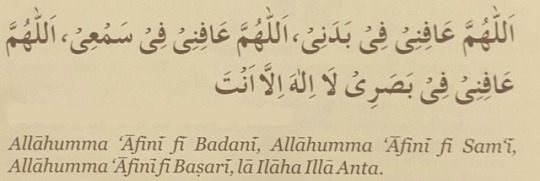
O Allah! Grant well-being to my body, O Allah! Grant well-being to my hearing, O Allah! Grant well-being to my sight. There is no deity but You. (Three Times)

O Allah! I seek refuge in You from disbelief and poverty. O Allah! I seek refuge in You from the punishment of the grave. There is no deity but You. (Three Times)

O Ever-Living, O Self-Subsisting, by Your mercy I seek (Your) assistance, rectify for me all my affairs and do not leave me to myself, even for a blink of an eye. (One Time)
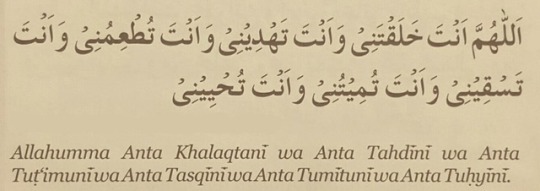
O Allah! You created me and You guide me and You feed me and You give me to drink and You will cause me to die and You cause me to live. (One Time)
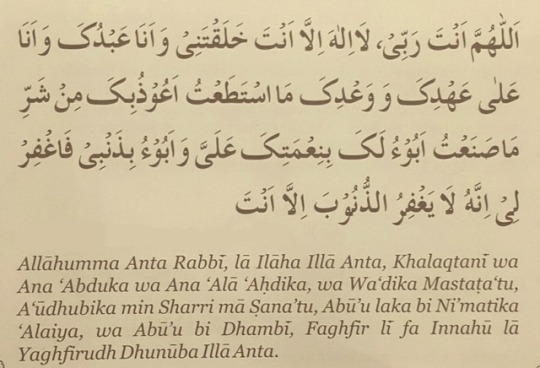
O Allah! You are my Lord; there is no deity except You. You created me and I am Your servant, I abide by Your covenant and promise to the best of my ability. I seek refuge with You from the evil of which I have committed. I acknowledge Your blessings upon me and I acknowledge my sin, so forgive me, for verily none forgives sins except You. (One Time)
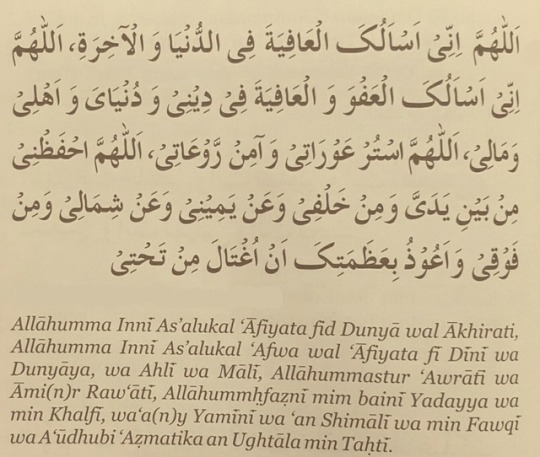
O Allah! Verily I ask You for wellness in this life and in the hereafter. O Allah! I ask You for forgiveness and well-being in my religion and in my worldly affairs and in my family and in my wealth. O Allah! Cover up my defects, and calm my fears. O Allah! Protect me from the front and from behind and from my right and from my left and from above and I seek refuge in Your Magnificence lest I am destroyed from beneath me. (One Time)

Sufficient for me is Allah; there is no deity except Him. On Him, I have relied, and He is the Lord of the Great Throne. (Seven Times)
#adhkaar#morning adhkaar#evening adhkaar#supplications#morning supplications#evening supplications#muslims#islam
14 notes
·
View notes
Text
حَدَّثَنَا أَحْمَدُ بْنُ عُبَيْدِ اللَّهِ الْغُدَانِيُّ، أَخْبَرَنَا غَسَّانُ بْنُ عَوْفٍ، أَخْبَرَنَا الْجُرَيْرِيُّ، عَنْ أَبِي نَضْرَةَ، عَنْ أَبِي سَعِيدٍ الْخُدْرِيِّ، قَالَ دَخَلَ رَسُولُ اللَّهِ صلى الله عليه وسلم ذَاتَ يَوْمٍ الْمَسْجِدَ فَإِذَا هُوَ بِرَجُلٍ مِنَ الأَنْصَارِ يُقَالُ لَهُ أَبُو أُمَامَةَ فَقَالَ " يَا أَبَا أُمَامَةَ مَا لِي أَرَاكَ جَالِسًا فِي الْمَسْجِدِ فِي غَيْرِ وَقْتِ الصَّلاَةِ " . قَالَ هُمُومٌ لَزِمَتْنِي وَدُيُونٌ يَا رَسُولَ اللَّهِ . قَالَ " أَفَلاَ أُعَلِّمُكَ كَلاَمًا إِذَا أَنْتَ قُلْتَهُ أَذْهَبَ اللَّهُ عَزَّ وَجَلَّ هَمَّكَ وَقَضَى عَنْكَ دَيْنَكَ " . قَالَ قُلْتُ بَلَى يَا رَسُولَ اللَّهِ . قَالَ " قُلْ إِذَا أَصْبَحْتَ وَإِذَا أَمْسَيْتَ اللَّهُمَّ إِنِّي أَعُوذُ بِكَ مِنَ الْهَمِّ وَالْحَزَنِ وَأَعُوذُ بِكَ مِنَ الْعَجْزِ وَالْكَسَلِ وَأَعُوذُ بِكَ مِنَ الْجُبْنِ وَالْبُخْلِ وَأَعُوذُ بِكَ مِنْ غَلَبَةِ الدَّيْنِ وَقَهْرِ الرِّجَالِ " . قَالَ فَفَعَلْتُ ذَلِكَ فَأَذْهَبَ اللَّهُ عَزَّ وَجَلَّ هَمِّي وَقَضَى عَنِّي دَيْنِي .
Narrated AbuSa'id al-Khudri:
One day the Messenger of Allah (ﷺ) entered the mosque. He saw there a man from the Ansar called AbuUmamah.
He ﷺ said: What is the matter that I am seeing you sitting in the mosque when there is no time of prayer?
He said: I am entangled in cares and debts, Messenger of Allah.
He ﷺ replied: Shall I not teach you words by which, when you say them, Allah will remove your care, and settle your debt?
He said: Why not, Messenger of Allah?
He ﷺ said: Say in the morning and evening: "O Allah, I seek refuge in Thee from care and grief, I seek refuge in Thee from incapacity and slackness, I seek refuge in Thee from cowardice and niggardliness, and I seek in Thee from being overcome by debt and being put in subjection by men."
He said: When I did that Allah removed my care and settled my debt.
Grade: Hassan (at-tirmidhi)
Reference: Sunan Abi Dawud, 1555
75 notes
·
View notes
Text
Call me weird, but “بحبك” is so much more intimate than “I love you”
#personal#i tell legit everyone that i love them#i once got too excited and told the waiter ‘ily’ and watched the poor boy turn red 😂#like im so used to saying it that it just doesnt feel that special anymore#but with بحبك i legit just said it to 3 people my parents included#so yeah#i dont even know why im ranting about this when i have an exam in a couple of hours and should go to sleep but oh well#so i love y’all#sleep tight#read your adhkaar#do your wird if you havent yet#do tawbah#forgive others#moisturize and brush your teeth
13 notes
·
View notes
Photo

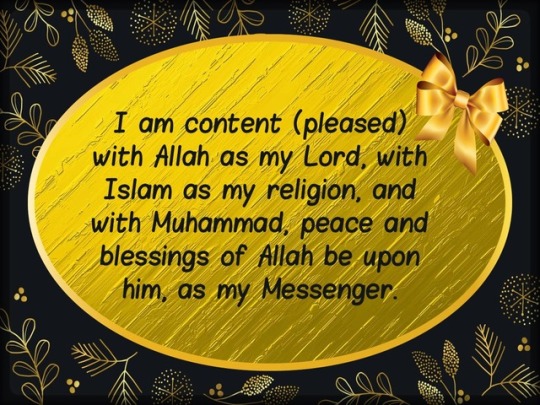
Morning and Evening Dhikr (Remembrance)
Radheetu billaahi Rabbaa wa bil-Islaami deenaa wa bi-Muhammadin Rasoolaa رَضِيتُ بِاللهِ رَبًّا وَبِالإِسْلاَمِ دِينًا وَبِمُحَمَّدٍ رَسُولاً.
I am content (pleased) with Allah as my Lord, with Islam as my religion, and with Muhammad, peace and blessings of Allah be upon him, as my Messenger.
Du’aa (Supplication) Related to the Adhaan (The Muslim Call to Ritual Prayer)
It was narrated from Sa'd bin Abi Waqqas (RA) that the Messenger of Allah (ﷺ) said: "Whoever says, when he hears the mu’adhdhin: 'Ash-hadu alla ilaha illallah wahdahu la sharika lahu wa anna Muhammadan 'abduhu wa Rasuluhu, radhitu billahi Rabban, wa bil-Islami dinan wa bi Muhammadin Rasula أشهد أن لا إله إلّا الله وحده لاشريك له وأنّ محمّدا عبده ورسوله رضيت بالله ربّا وبالإسلام دينا وبمحمّد رسولا (I bear witness that there is none worthy of worship except Allah alone, with no partner or associate, and that Muhammad (SAWS) is His slave and Messenger; I am content with Allah as my Lord, Islam as my religion and Muhammad (SAWS) as my Messenger),' his sins will be forgiven."
Note:
Say this prayer immediately following the declaration of faith called by the mu’adhdhin (prayer caller).
Grade: Sahih (Darussalam)
English reference: Vol. 1, Book 7, Hadith 680
Arabic reference: Book 7, Hadith 687
Source of Hadith:
The Book of the Adhan (The Call to Prayer) - Sunan an-Nasa'i - Sunnah.com - Sayings and Teachings of Prophet Muhammad (صلى الله عليه و سلم)
#Islam#Islamic#Arabic#Du'aas#Supplication#Ad'iyah#Dhikr#Adhkaar#Remembrances#Islamic remembrances#Morning and evening#Allah#God#Muhammad (SAW)#Adhaan#Islamic call to prayer#Azan#Adhan#Religion#Deen#Mu'adhdhin#Muezzin#Mosque#Masjid#Sunnah#Hadith#Prayer#Muslims#أذكار الصباح والمساء#Morning and evening dhikr
2 notes
·
View notes
Note
Assalamualaikum sister.
I Started praying 2 years ago and everything was perfect الحمد لله. I never skipped a prayer and i used to pray the sunnah prayer too BUT unfortunately things have changed. I’m ashamed to say this but i stopped praying. I have no motivation to pray and i know i should still pray even if i have no motivation but i still end up skipping the prayers. I feel very bad but i still don’t do anything about it. Sometimes i feel like God hates me or something. I don’t know, i feel really alone and i hate myself too. I don’t know where to start
Wa alaykum assalamu wa rahmatu Allahi wa barakatuhu dear,
You start by saying اعوذ بالله من الشيطان الرجيم - I seek refuge with Allah from the accursed Satan.
I think I have answered a similar ask before, either here or on my main blog, so I am going to sum up the main points. See, everything you are describing is from Shaytan. He would get in the head of a practicing Muslim or someone who just found their way to Allah swt and start making them lazy, lethargic, skipping prayers, being distracted, and whatnot. But that one sentence you said " I feel like God hates me " that's was Shaytan's aim all along, to make you feel that way. To get the believer in a state of despair from Allah's love and Allah's mercy and convince them that they are unworthy of His forgiveness so there is no point in repenting, no point in trying, no point in sticking to prayer, and further acts of worship. AstaghfiruAllah.
Now first thing to do is to realize that this is all devilish wicked games that have no accuracy or validity in real life whatsoever. Allah swt does not deal with us based on Human relationship rules. Between us humans, if someone doesn't respect you, someone doesn't obey the rules for example, or if someone hurt us, there will be consequences, you might cut that person off of your life, close all communication doors with them, etc. But that's not how our relationship with Allah swt works, it is one of the most common mistakes and misconceptions that people have, to think of Allah swt in human characteristics. Whereas, Allah swt is ABOVE that. He is the most merciful, the most generous, He doesn't get bored or sick or annoyed of forgiving us and giving us second chances as long as we don't get bored of repenting. And that's a Hadith.
I think it all starts once you change your perspective on Allah swt and on prayer also. Thinking of prayer as a task is a bit exhausting I gotta admit, but I once heard someone say about prayer that they are going to go " hang out " with Allah swt, spend some time and talk to Him swt - and that's such a beautiful concept tbh. May Allah swt allow us to reach such advanced levels of love for Him. You can think of it as answering a call of the most beloved, most important .. if someone that you love so much calls you on the phone would you answer? Would you talk to them? Would you do it every time they call? Think of the Adhaan as an even more important call that you have to answer, out of love - if you accept that perspective.
Also, Allahuma barik laki wa jazaki Allahu kulla khayr, may Allah swt bless your pure heart but sis, when you start something, I get that at first you are very excited, very focused, you give it your all, but have you heard of something called Burnout? It's okay to take things slow, the most beloved deeds to Allah swt are the smallest yet most consistent. Allah swt would rather have you pray all your obligatory prayers (on time) for years on nonstop than pray all obligatory and sunnah for a while then just abruptly stop. And Allah swt knows best.
Anyways, all you have to do is get up, perform your wudhu, grab your praying matt and say Allahu akbar. The rest will follow.
I highly recommend you stick to certain morning and evening adhkaar, like seeking refuge in Allah swt from laziness and despair and from Shaytan. Make abundant duaa that Allah swt guides your heart and helps you through this journey. Be honest with Allah swt, talk to Him and ask Him for help because He is the only one who can and will really help you my dear. And most importantly, never be ashamed we are humans, we are sinners by nature, Allah swt has made us this way, to fall then repent, as long as we keep walking on his straight path.
May Allah swt help you continue walking on his path and find your way back to Him. Ameen. May Allah swt ease your affairs and make your heart eager for prayer. Ameen 🤍🤍
- A. Z. 🍃
7 notes
·
View notes

